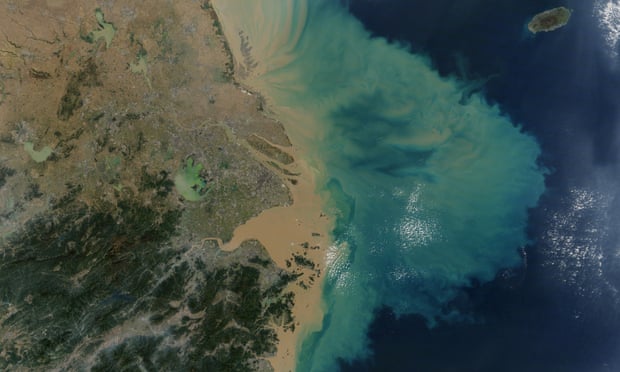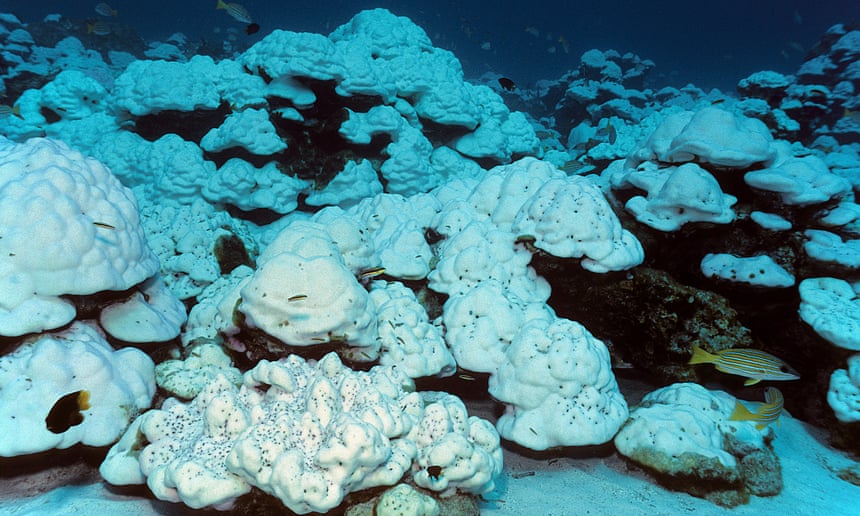Wednesday January 22nd… Dear Diary. The main purpose of this ongoing post will be to track United States extreme or record temperatures related to climate change. Any reports I see of ETs will be listed below the main topic of the day. I’ll refer to extreme or record temperatures as ETs (not extraterrestrials)😉
Very Alarming Ocean Heat Content Trends
Dear Diary. As a scientist I know that what happens thermodynamically in the oceans has much more impact on our climate system than short term variations in the atmosphere. Since total ocean heat capacity (or latent heat) is about 1000x greater than total atmosphere, it means that a barely measurable temperature increase in the ocean (1/1000th of a degree C) could drive a massive spike in global air temperature (1 degree C).
So, when I see charts showing that heat content of the oceans is not varying but is steadily increasing I become very alarmed. As of 2020 this is what we see via a Guardian article:
Ocean temperatures hit record high as rate of heating accelerates
Oceans are clearest measure of climate crisis as they absorb 90% of heat trapped by greenhouse gases

The heat in the world’s oceans reached a new record level in 2019, showing “irrefutable and accelerating” heating of the planet.
The world’s oceans are the clearest measure of the climate emergency because they absorb more than 90% of the heat trapped by the greenhouse gases emitted by fossil fuel burning, forest destruction and other human activities.
The new analysis shows the past five years are the top five warmest years recorded in the ocean and the past 10 years are also the top 10 years on record. The amount of heat being added to the oceans is equivalent to every person on the planet running 100 microwave ovens all day and all night.

Why do record ocean temperatures matter?
(Click on the above article to read more.)
Hotter oceans lead to more severe storms and disrupt the water cycle, meaning more floods, droughts and wildfires, as well as an inexorable rise in sea level. Higher temperatures are also harming life in the seas, with the number of marine heatwaves increasing sharply.
The most common measure of global heating is the average surface air temperature, as this is where people live. But natural climate phenomena such as El Niño events mean this can be quite variable from year to year.
“The oceans are really what tells you how fast the Earth is warming,” said Prof John Abraham at the University of St Thomas, in Minnesota, US, and one of the team behind the new analysis. “Using the oceans, we see a continued, uninterrupted and accelerating warming rate of planet Earth. This is dire news.”
“We found that 2019 was not only the warmest year on record, it displayed the largest single-year increase of the entire decade, a sobering reminder that human-caused heating of our planet continues unabated,” said Prof Michael Mann, at Penn State University, US, and another team member.
The analysis, published in the journal Advances In Atmospheric Sciences, uses ocean data from every available source. Most data is from the 3,800 free-drifting Argo floats dispersed across the oceans, but also from torpedo-like bathythermographs dropped from ships in the past.
The results show heat increasing at an accelerating rate as greenhouse gases accumulate in the atmosphere. The rate from 1987 to 2019 is four and a half times faster than that from 1955 to 1986. The vast majority of oceans regions are showing an increase in thermal energy.
This energy drives bigger storms and more extreme weather, said Abraham: “When the world and the oceans heat up, it changes the way rain falls and evaporates. There’s a general rule of thumb that drier areas are going to become drier and wetter areas are going to become wetter, and rainfall will happen in bigger downbursts.”

Hotter oceans also expand and melt ice, causing sea levels to rise. The past 10 years also show the highest sea level measured in records dating back to 1900. Scientists expect about one metre of sea level rise by the end of the century, enough to displace 150 million people worldwide.
Dan Smale, at the Marine Biological Association in the UK, and not part of the analysis team, said the methods used are state of the art and the data is the best available. “For me, the take-home message is that the heat content of the upper layers of the global ocean, particularly to 300 metre depth, is rapidly increasing, and will continue to increase as the oceans suck up more heat from the atmosphere,” he said.

Heatwaves sweeping oceans ‘like wildfires’, scientists reveal
(Click on the above article to read more.)
“The upper layers of the ocean are vital for marine biodiversity, as they support some of the most productive and rich ecosystems on Earth, and warming of this magnitude will dramatically impact on marine life,” Smale said.
The new analysis assesses the heat in the top 2,000m of the ocean, as that is where most of the data is collected. It is also where the vast majority of the heat accumulates and where most marine life lives.
The analysis method was developed by researchers at the Chinese Academy of Sciences in Beijing and uses statistical methods to interpolate heat levels in the few places where there was no data, such as under the Arctic ice cap. An independent analysis of the same data by the US National Oceanographic and Atmospheric Administration shows that same increasing heat trend.
Reliable ocean heat measurements stretch back to the middle of the 20th century. But Abraham said: “Even before that, we know the oceans were not hotter.”
“The data we have is irrefutable, but we still have hope because humans can still take action,” he said. “We just haven’t taken meaningful action yet.”
………………………………………………………………………………………
Since people live on land they are much more attuned to atmospheric weather than “ocean weather,” but all should heed these important trends. I’ll be posting more on the science of oceanography as we roll through 2020.
Here is some more weather and climate news from Wednesday:
(As usual, this will be a fluid post in which more information gets added during the day as it crosses my radar, crediting all who have put it on-line. Items will be archived on this site for posterity.)
(If you like these posts and my work please contribute via the PayPal widget, which has recently been added to this site. Thanks in advance for any support.)
The Climate Guy